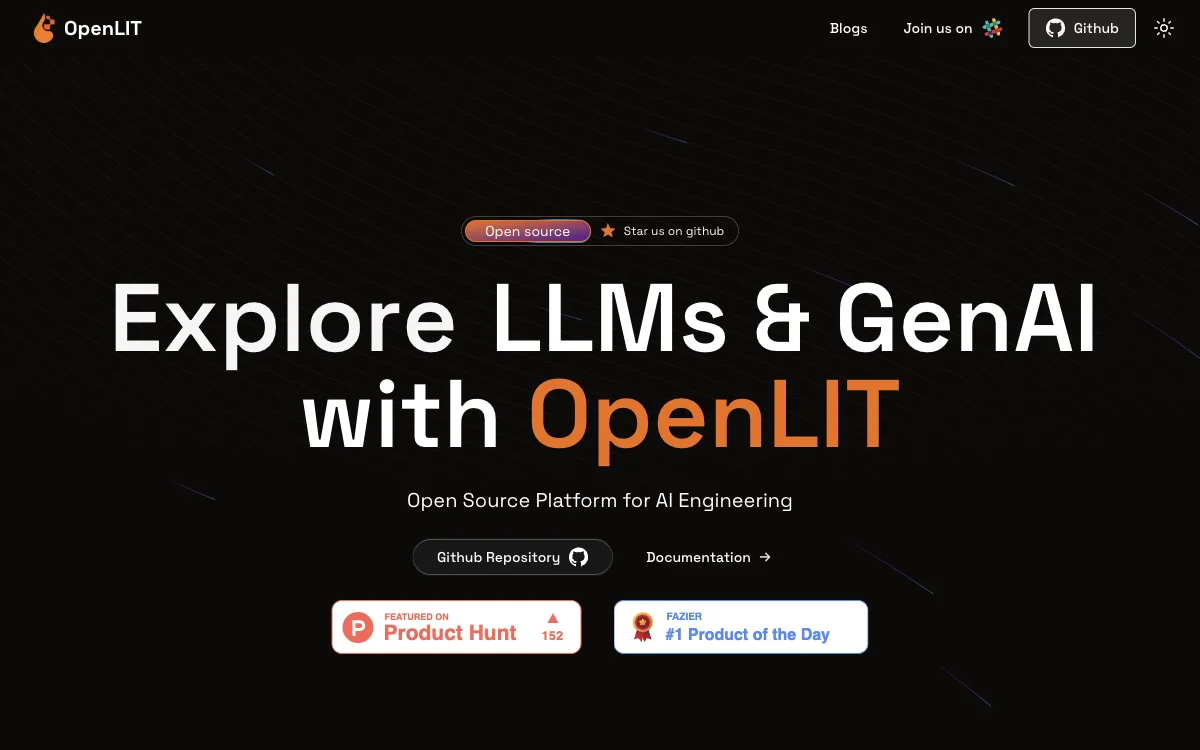OpenLIT stands as a beacon for developers navigating the complex waters of AI development, particularly in the realms of Generative AI and Large Language Models (LLMs). This open-source platform is engineered to streamline the AI development workflow, making it more efficient and less cumbersome. With OpenLIT, developers can experiment with LLMs, organize and version prompts, and manage API keys securely, all within a unified environment.
One of the standout features of OpenLIT is its application and request tracing capability. This feature provides end-to-end tracing of requests across different providers, enhancing performance visibility and allowing developers to pinpoint inefficiencies or bottlenecks in their applications. Detailed span tracking further complements this by monitoring each span for response time and efficiency, ensuring that every component of the application is performing optimally.
OpenLIT's support for OpenTelemetry is another significant advantage. This integration allows for the automatic tracking of AI applications, offering deep insights into performance and behavior. Such data is invaluable for developers looking to optimize their applications for better scalability and efficiency.
Cost tracking is another critical feature of OpenLIT. It meticulously tracks the cost associated with using different LLMs, enabling developers to make informed decisions that balance performance needs with budget constraints. This feature is particularly beneficial for projects where cost efficiency is as crucial as technical performance.
Exception monitoring in OpenLIT is designed to enhance application reliability. It monitors and logs application errors, facilitating quick detection and troubleshooting of issues. The platform's SDKs for Python and TypeScript allow for seamless exception monitoring without significant alterations to the application codebase. Detailed stacktraces provide comprehensive insights into where things went wrong, making it easier for developers to address and rectify issues.
OpenLIT also offers a playground for testing and comparing different LLMs side-by-side based on performance, cost, and other key metrics. This feature is invaluable for developers looking to select the most suitable LLM for their specific needs. Comprehensive reporting capabilities compile and visualize comparison data, supporting informed decision-making.
Prompt management is another area where OpenLIT shines. It provides a centralized repository for the organized storage, versioning, and usage of prompts with dynamic variables across different applications. This feature simplifies the management of prompts, making it easier for developers to create, edit, and track different versions of their prompts.
Secure secrets management is also a critical component of OpenLIT. It offers a secure way to store and manage sensitive application secrets, ensuring that they are easily accessible yet protected from unauthorized access. This feature is essential for maintaining the security and integrity of applications.
Integration with OpenLIT is straightforward. Developers can start collecting data from their LLM applications by simply adding openlit.init(). The platform's native support for OpenTelemetry makes adding it to projects feel effortless and intuitive, further lowering the barrier to entry for developers.
In summary, OpenLIT is a comprehensive observability platform that addresses the multifaceted needs of AI development. Its open-source nature, combined with a wide array of features designed to simplify and enhance the AI development workflow, makes it an invaluable tool for developers working with Generative AI and LLMs.

